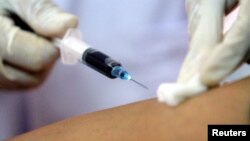HANOI —
Treatment for intravenous drug users in Vietnam remains a very sensitive subject, but the expansion of methadone treatment has been welcomed by HIV clinicians.
In 2002 international donors warned that rapidly rising numbers of HIV/AIDS cases could threaten Vietnam’s economic development. A decade later aid groups are praising the country for expanding harm reduction policies, at least in the availability of methadone.
By the end of 2011 there were more than 170,000 registered drug users in Vietnam, 85 percent of them addicted to heroin. Drug use and sex work are categorized as “social evils” and are among the three groups most vulnerable to catching HIV. The third is men who have sex with men.
Until a few years ago the only option for many local authorities to deal with drug users and sex workers was to segregate them from society in controversial rehabilitation centers. The centers met with international condemnation last year after a report last year by Human Rights Watch accused them of forced labor. Relapse rates are high and some experts have said the money used to fund the centers would be better spent on public health.
However, since 2008 there has been another solution, methadone maintenance treatment, welcomed by some as a cheaper and more effective way of dealing with heroin addiction.
Do Duy Cuong, head of the HIV outpatient unit at Bach Mai hospital, says methadone treatment, along with distribution of condoms and clean syringes, can make a huge difference in preventing the spread of HIV/AIDS.
Taken daily in liquid form, methadone eases symptoms of heroin withdrawal and helps stop the spread of HIV caused by the use of dirty needles. Cuong says it also helps reduce crime because people do not need to steal to buy heroin.
Since 2008, a U.S. program called the President's Emergency Plan for AIDS Relief, or PEPFAR, has built 13 methadone clinics across Vietnam. By 2015, the Vietnamese government plans to have 30 such clinics, reaching 80,000 of the country’s drug users. At the moment the clinics now treat nearly 10,000 people.
Increased access to methadone treatment is overdue, says Thi Van Anh, deputy head of infectious diseases at Hai Phong Medical University.
“I think we need to expand more because it doesn’t meet the needs of the people who are in need because we still have a lot of IDU (injecting drug users) who still cannot approach methadone treatment." She thinks methadone treatment should be integrated into the rehabilitation centers.
Many medical staff who treat HIV/AIDS patients do not provide recommendations for support of drug or alcohol addicts.
However, a new website set up with assistance from the U.S. embassy in Hanoi, the Centers for Disease Control and the Vietnamese government could help change that. The website provides training and advice in Vietnamese to clinicians across the country. Anyone can set up an account and access the site, but Van Anh says it will be particularly useful for medical staff.
“The number of doctors in Hai Phong who can read English is very few so their capacity to read English journal and capacity to analyze an article is very limited, but this website was made by national experts and it is in Vietnamese and available 24 hours," she said.
In a response to what some observers say is a combination of international pressure and a changing attitude within the government, last month the National Assembly passed an amendment to a law which will mean all sex workers detained in the centers, reported at around 900, will be released in July. Many hope the same will be said of drug users in the not-so-distant future.
In 2002 international donors warned that rapidly rising numbers of HIV/AIDS cases could threaten Vietnam’s economic development. A decade later aid groups are praising the country for expanding harm reduction policies, at least in the availability of methadone.
By the end of 2011 there were more than 170,000 registered drug users in Vietnam, 85 percent of them addicted to heroin. Drug use and sex work are categorized as “social evils” and are among the three groups most vulnerable to catching HIV. The third is men who have sex with men.
Until a few years ago the only option for many local authorities to deal with drug users and sex workers was to segregate them from society in controversial rehabilitation centers. The centers met with international condemnation last year after a report last year by Human Rights Watch accused them of forced labor. Relapse rates are high and some experts have said the money used to fund the centers would be better spent on public health.
However, since 2008 there has been another solution, methadone maintenance treatment, welcomed by some as a cheaper and more effective way of dealing with heroin addiction.
Do Duy Cuong, head of the HIV outpatient unit at Bach Mai hospital, says methadone treatment, along with distribution of condoms and clean syringes, can make a huge difference in preventing the spread of HIV/AIDS.
Taken daily in liquid form, methadone eases symptoms of heroin withdrawal and helps stop the spread of HIV caused by the use of dirty needles. Cuong says it also helps reduce crime because people do not need to steal to buy heroin.
Since 2008, a U.S. program called the President's Emergency Plan for AIDS Relief, or PEPFAR, has built 13 methadone clinics across Vietnam. By 2015, the Vietnamese government plans to have 30 such clinics, reaching 80,000 of the country’s drug users. At the moment the clinics now treat nearly 10,000 people.
Increased access to methadone treatment is overdue, says Thi Van Anh, deputy head of infectious diseases at Hai Phong Medical University.
“I think we need to expand more because it doesn’t meet the needs of the people who are in need because we still have a lot of IDU (injecting drug users) who still cannot approach methadone treatment." She thinks methadone treatment should be integrated into the rehabilitation centers.
Many medical staff who treat HIV/AIDS patients do not provide recommendations for support of drug or alcohol addicts.
However, a new website set up with assistance from the U.S. embassy in Hanoi, the Centers for Disease Control and the Vietnamese government could help change that. The website provides training and advice in Vietnamese to clinicians across the country. Anyone can set up an account and access the site, but Van Anh says it will be particularly useful for medical staff.
“The number of doctors in Hai Phong who can read English is very few so their capacity to read English journal and capacity to analyze an article is very limited, but this website was made by national experts and it is in Vietnamese and available 24 hours," she said.
In a response to what some observers say is a combination of international pressure and a changing attitude within the government, last month the National Assembly passed an amendment to a law which will mean all sex workers detained in the centers, reported at around 900, will be released in July. Many hope the same will be said of drug users in the not-so-distant future.





